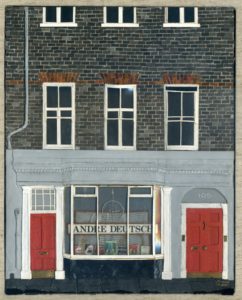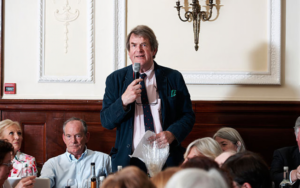For a very short time, almost fifty years ago, I worked alongside Jeremy Lewis in a ramshackle office, partitioned to give just enough space for us to reach our desks: in my case, not actually a desk but a rickety table at which I sat for the half day each week that my infant son was looked after by a friend.

Forty-some years later, I re-met Jeremy – who I knew only as a kindly but ghostly presence, for there had been a bubbly glass partition between us – at the funeral of a mutual friend. By then, he had long since immortalised his stint at Deutsch in Kindred Spirits: Adrift in Literary London, and I had become a devoted follower of his column in The Oldie and the well-satisfied reader of many of his books, both light and heavy.
What brought him into my life in a less shadowy form was that I wrote a book myself and was persuaded to ask for his help in getting it noticed. Having worked for André Deutsch for over thirty years, the book was as much about life at 105 Great Russell Street as about my private ups and downs. His response was immediate and generous, and led to reviews I would never have got without his imprimatur.
What happened next, and brought about our actually meeting – for at the funeral we had done no more than exchange glances – was pure chance.
I had been invited to appear at Jewish Book Week, in conversation with Peter Owen. Too good to be true! Not only was he the most interesting of small publishers but, more to the point, his name guaranteed we would have an audience. Or would have done. Shortly before the event he had to bow out. His book wouldn’t be published in time.
Panic! Alone on the platform, I would have been alone in the room. The staff at JBW, my publisher and I all cast about wildly for someone who didn’t mind being asked at the last minute and whose name would fill seats. It was Jeremy who stepped into the breach.

Jeremy at an Oldie lunch Photograph © Neil Spence
Now, in the ‘green room’ and then on the stage, we met at last and I found that, unlike so many writers, Jeremy was just as you would expect him to be: funny, self-deprecating and wonderfully relaxed, the polar opposite of the comic novelist who in the flesh turned out to be a belligerent, middle-aged soak.
And thus, in a session chaired by Michele Hanson (another comforting presence), the event went ahead after all and I experienced the joy of Jeremy in person for the first and last time.
There are not many people who will be missed by everyone who has known them. But it is hard to imagine anyone who won’t miss Jeremy’s genial, shambling presence, his wit and, indeed, his erudition. Not only a thoroughly likeable man but a literary gent of the highest order.
Jeremy Morley Lewis, born 15 March 1942, died 9 April 2017.